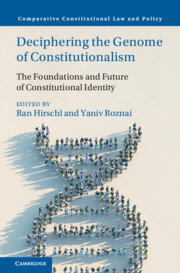Book contents
- Deciphering the Genome of Constitutionalism
- Comparative Constitutional Law and Policy
- Deciphering the Genome of Constitutionalism
- Copyright page
- Contents
- Figures
- Contributors
- Preface
- Acknowledgments
- Introduction
- Part I Foundations, Theory, and Concepts
- Part II Comparative Perspectives
- Part III American Constitutionalism and Constitutional Identity
- 14 “This Is (Not) Who We Are”
- 15 Constitutional Aspirationalism Revisited
- 16 The Constitution at War with Itself
- 17 Constitutional Identity, Constitutional Politics, and Constitutional Revolutions
- 18 American Constitutional Exceptionalism, Constitutional Identity, and Democracy
- Part IV Emerging Trends
- Index
- References
16 - The Constitution at War with Itself
Race, Citizenship, and the Forging of American Constitutional Identity
from Part III - American Constitutionalism and Constitutional Identity
Published online by Cambridge University Press: 14 March 2024
- Deciphering the Genome of Constitutionalism
- Comparative Constitutional Law and Policy
- Deciphering the Genome of Constitutionalism
- Copyright page
- Contents
- Figures
- Contributors
- Preface
- Acknowledgments
- Introduction
- Part I Foundations, Theory, and Concepts
- Part II Comparative Perspectives
- Part III American Constitutionalism and Constitutional Identity
- 14 “This Is (Not) Who We Are”
- 15 Constitutional Aspirationalism Revisited
- 16 The Constitution at War with Itself
- 17 Constitutional Identity, Constitutional Politics, and Constitutional Revolutions
- 18 American Constitutional Exceptionalism, Constitutional Identity, and Democracy
- Part IV Emerging Trends
- Index
- References
Summary
This chapter focuses on constitutional disharmony as central to forging constitutional identity by looking at the place of Black citizenship prior to the Civil War. While there are powerful arguments that the Constitution could be seen as antislavery, even while it allowed for slavery to persist where it already existed, those who were antislavery did not give much thought to the place of Blacks within the constitutional order—particularly not to the question of Black citizenship. It was, rather, events such as the second Missouri Crisis of 1821 that forced the issue of Black citizenship onto the polity. Events forced constitutional actors to wrestle with questions that were not clear, or easily answered, by way of constitutional text. This chapter offers an important contrast to more prevalent approaches – to either originalism or moral readings – that too often try to dissolve constitutional disharmony.
Keywords
- Type
- Chapter
- Information
- Deciphering the Genome of ConstitutionalismThe Foundations and Future of Constitutional Identity, pp. 204 - 215Publisher: Cambridge University PressPrint publication year: 2024

